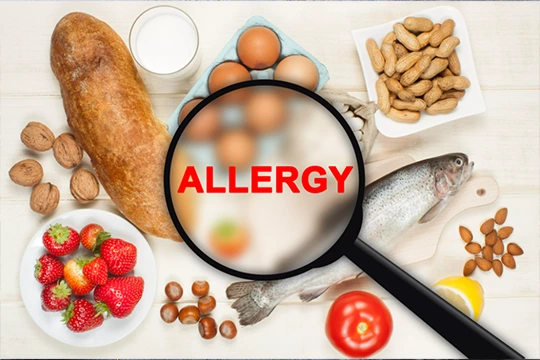
“Allergen-free organic foods” refer to food products that are produced using organic farming methods and are specifically formulated or prepared to minimize the presence of common allergens. These foods cater to individuals with food allergies or sensitivities by avoiding ingredients known to trigger allergic reactions.
Common food Allergens
Common food allergens are substances that trigger an allergic reaction in sensitive individuals. These allergens can vary in severity from mild reactions to life-threatening responses. For examples: Nuts, Eggs, Dairy, Soy, Wheat, Fish, Shellfish, Sesame, Mustard and Celery etc.
Can you be allergic to Organic food?

You can be allergic to any food, whether it’s the organic version or not. If you are allergic to strawberries, you will be allergic to both organic and conventional.
If you are allergic to a particular pesticide or fertilizer, you might be able to tolerate the organic version but not the conventional.
I think it’s less likely to go in the other direction, but I could see the possibility. The organic version could have been grown with some kind of accepted non-synthetic compound that you are allergic to, or maybe a type manure you can’t tolerate. And maybe you didn’t wash it well enough.
It seems very unlikely, but you never know.
Benefits of Organic food for allergies
The benefits of organic foods primarily stems from the farming practices used to produce them, which avoid synthetic chemicals and focus on sustainable, natural methods. Here are key reasons why organic foods can be beneficial for individuals with allergies:
• Reduced Exposure to Pesticides and Chemicals
• Natural and Safe Production Methods
• Higher Nutritional Value
• Allergen Management and Transparency
• Support for Sustainable Agriculture
Allergy friendly Alternatives
Allergy-friendly alternatives are substitutes for common allergens in foods that allow individuals with allergies to enjoy a varied and nutritious diet without triggering allergic reactions. Here are some common allergens and their allergen-free alternatives:
1. Dairy
• Alternatives: Almond milk, soy milk, oat milk, rice milk, coconut milk, cashew milk, hemp milk.
• Products: Dairy-free cheeses, yogurts, and ice creams made from these alternative milks.
2. Eggs
• Alternatives: Flaxseed meal or chia seeds mixed with water (as egg replacers), applesauce, mashed bananas, commercial egg replacers (e.g., Ener-G, Bob's Red Mill).
• Products: Egg-free mayonnaise, egg-free baked goods.
3. Wheat (Gluten)
• Alternatives: Gluten-free flours (rice flour, almond flour, coconut flour, chickpea flour, sorghum flour), gluten-free oats, quinoa, millet, buckwheat.
• Products: Gluten-free bread, pasta, cereals, and baked goods.
4. Soy
• Alternatives: Coconut amino (as a soy-sauce substitute), sunflower seed butter, almond butter, pea protein, hemp protein.
• Products: Soy-free tofu alternatives made from chickpeas or other legumes.
5. Nuts
• Alternatives: Seeds (sunflower seeds, pumpkin seeds, flaxseeds, chia seeds), seed butters (sunflower seed butter, pumpkin seed butter).
• Products: Nut-free snacks, seed-based granolas, and seed-based spreads.
6. Sesame
• Products: Nut-free snacks, seed-based granolas, and seed-based spreads.
• Products: Seed butters that are sesame-free, such as sunflower seed butter.


7. Mustard
• Alternatives: Vinegar-based dressings, homemade dressings using lemon juice or apple cider vinegar, spices like turmeric or paprika for flavour.
• Alternatives: Vinegar-based dressings, homemade dressings using lemon juice or apple cider vinegar, spices like turmeric or paprika for flavour.
8. Celery
• Alternatives: Carrots, cucumber, bell peppers, jicama for crunch in salads and dishes.
• Products: Celery-free soups and stocks.
Summary
Overall, allergy-friendly or allergen-free organic foods combine the benefits of organic farming with considerations for allergen management, providing a safe and nutritious dietary choice for individuals with specific dietary restrictions due to allergies.
More Updates


